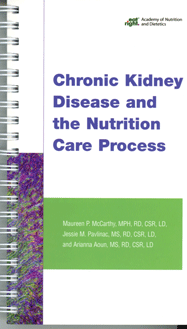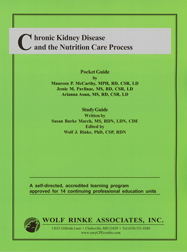|
Chronic Kidney Disease and the Nutrition Care Process
This CPE activity compiles the latest evidence-based guidelines and recommendations from the most authoritative sources on medical nutrition therapy (MNT) for chronic kidney disease (CKD). It is organized according to the steps of the Nutrition Care Process (NCP), uses the International Dietetics and Nutrition Terminology (IDNT) standardized language, and case studes illustrate progression through the NCP. This on-the-go reference is essential for RDNs who provide MNT for patients with CKD stages 3 to 5D. Great resource to help you pass your Board Certification as a Specialist in Renal Nutrition (CSR). Upon completion of this CPE activity you will be better able to:
- Apply the Evidence-Based Nutrition Practice Guidelines (EBNPG) for Chronic Kidney Disease (CKD) when evaluating patients/clients for screening and referral for Medical Nutrition Therapy (MNT);
- Write a Nutrition Diagnosis, as described in the Nutrition Care Process and Model (NCPM), and apply the appropriate International Dietetics and Nutrition Terminology (IDNT);
- Assess supplements that can interact/impact a patient/client's renal function;
- Evaluate patient's intake and recommend use of Intradialytic Parenteral Nutrition (IDPN);
- Develop a nutrition prescription appropriate to the patient/client's stage of CKD.
Share with a friend and Save! Click here for important information about
sharing.
To order an ADDITIONAL Reporting Form click below:
| C267F |
14 CPEUs |
REPORTING FORM |
|
|
Chronic Kidney Disease and the Nutrition Care Process
© 2024 Wolf Rinke Associates. All rights reserved for this self-directed accredited learning activity. Reproduction in whole or part without written permission, except for brief excerpts, is prohibited.
LEARNING OBJECTIVES
Upon completion of this CPE activity you will be better able to:
-
Apply the Evidence-Based Nutrition Practice Guidelines (EBNPG) for Chronic Kidney Disease (CKD) when evaluating patients/clients for screening and referral for Medical Nutrition Therapy (MNT);
-
Perform a food-and nutrition related assessment for patients with CKD;
-
Write a Problem, Etiology, Signs and Symptoms (PES) statement, identifying appropriate domains related to CKD;
-
Write a Nutrition Diagnosis, as described in the Nutrition Care Process and Model (NCPM), and apply the appropriate International Dietetics and Nutrition Terminology (IDNT);
-
Apply nutrition recommendations from the National Kidney Foundation Kidney Disease Outcomes Quality Initiative (NKF-KDOQI);
-
Assess the different treatments for different stages of CKD;
-
Interpret biochemical data in patients/clients with CKD;
-
Evaluate medications that could impact renal function in patients with CKD such as those for hypertension (HTN), phosphate binders, cardiac medications, and hypoglycemic agents for type 2 diabetes (DM2);
-
Assess supplements that can interact/impact a patient/client's renal function;
-
Calculate energy, protein, and fluid needs as appropriate for the patient/clients stage of CKD: stages 3, 4, 5, and 5D;
-
Calculate adjusted body weight (ABW) to determine energy and protein needs for underweight and obese patients;
-
Apply knowledge about requirements of vitamins to identify potential deficiencies in CKD;
-
Evaluate patient's intake and recommend use of Intradialytic Parenteral Nutrition (IDPN);
-
Develop a nutrition prescription appropriate to the patient/client's stage of CKD;
-
Perform nutrition monitoring and evaluation to determine whether the patient/client is meeting nutrition goals;
-
Assist patients/clients in achieving recommended intakes for protein, fiber, calcium, vitamin D, potassium, and phosphorus with various stages and treatments for CKD;
-
Evaluate patient/client's readiness for nutritional counseling and determine behavior change strategies;
-
Develop physical activity recommendations appropriate to patient/client's abilities and stage of CKD;
-
Specify percentage of calories recommended from high biological protein sources;
-
Counsel patients/clients on appropriate supplement dosage/usage;
-
Recommend patient nutrition education resources from professional sources including the Academy of Nutrition and Dietetics (Academy).
ABOUT THE AUTHORS OF THE POCKET GUIDE
Sara Erickson, RD, CSR, LDN, CNSC, Pediatric Renal Dietitian
Carolinas Healthcare System (Levine Children's Hospital), Charlotte, NC
Rachael R. Majorowicz, RD, LD Clinical Renal Dietitian Mayo Clinic Rochester, MN
Jean Stover, RD, LDN Renal Dietitian DaVita Conshohocken, PA
MEMBERS OF THE IDNT ADVISORY PANEL
Donna Pertel, MEd, RD Elise Smith, MA, RD, LD
ABOUT THE AUTHOR OF THE STUDY GUIDE
Over the past 25 years Registered and Licensed Dietitian Susan Burke March has made her personal passion for healthy living and smart weight management her vocation. Susan holds undergraduate and graduate degrees in nutrition and education, is a certified diabetes educator, and holds advanced certificates of training in Adult Weight Management (Levels 1 and 2) and Childhood and Adolescent Weight Management. She served as Chief Clinical Nutrition Manager at Mt. Sinai Hospital of Queens, New York.
Susan is the former Vice President of Nutrition and Chief Nutritionist for eDiets.com, a leader in the online weight management program arena. She led the nutritional development of a roster of healthy weight programs, and spearheaded development of unprecedented features and services that today are commonplace in the online weight management industry. Susan served on the board of the Weight Management Dietetic Practice Group of the Academy of Nutrition and Dietetics, and as a spokesperson for the Florida Academy of Nutrition and Dietetics.
Susan is the author of the practical and informative book Making Weight Control Second Nature: Living Thin Naturally (Mansion Grove House, 2009) and the accompanying 26-CPEU study guide published by Wolf Rinke Associates (2010). She and her husband Ken are currently living and studying Spanish in Ecuador's third largest city, Cuenca. Susan is the Nutrition and Health Columnist for CuencaHighlife.com, and enjoys blogging about Ecuadorian food, health issues, and nutrition news for the expat community.
If you prefer to order by phone, mail
or fax click below
or click here to contact us with
other questions.
For information about our other products and
services return to the sidebar at the top of the page.
|
|
|


